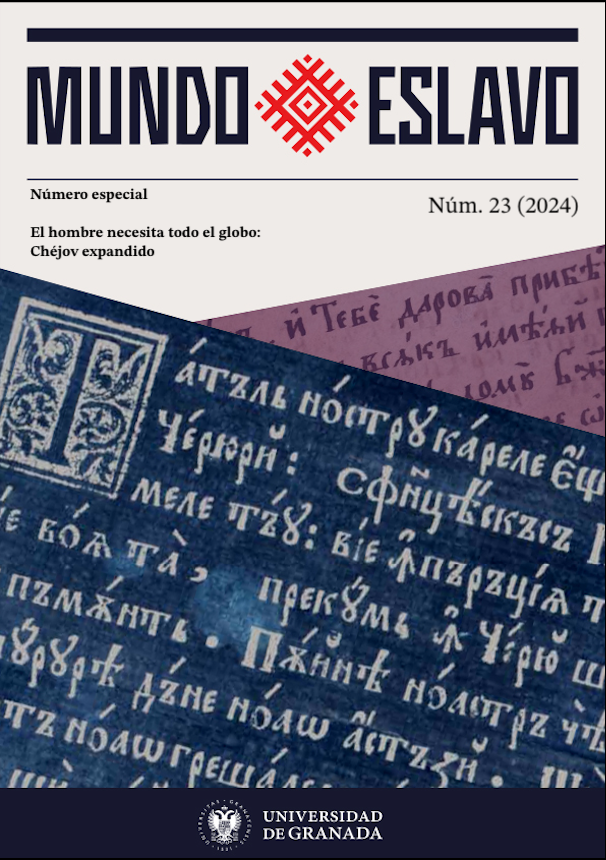Chekhov´s Self-Assessment and Assessments of His Work by His Contemporaries
DOI:
https://doi.org/10.30827/meslav.23.31667Keywords:
Russian Literature, Anton Chekhov, self-assessment, Chekhovian criticism’s assessmentsAbstract
The author addresses the question of how Chekhov's assessments of his work diverged or, on the contrary, coincided with the assessments of his contemporaries. Chekhov was equally characterized by personal modesty and sobriety of judgment, and therefore his reviews of his own work were often excessively harsh. On the other hand, the phenomenon of the rejection of early Chekhov by contemporary critics is well known. Before the writer became a "living classic", critics found many shortcomings in his stories and plays, but after recognition by the mass reader, the same critics often saw only virtues in the same texts. The Symbolists played a special role in establishing Chekhov's literary reputation, such as Dmitry Merezhkovsky and Andrei Bely. These Symbolist poets, acting as critics, no longer reproach Chekhov for the lack of a unifying “general idea” and do not see his merit in the fact that he expresses “longing” for such a social idea. They note completely different qualities that are close to themselves: a feeling of uncertainty and understatement, close to the influence of music (Dmitry Merezhkovsky), or a “thinning of reality” almost to a symbol (Andrei Bely). These and other properties of Chekhov’s world, after the performances of the Moscow Art Theater, received the name “Chekhov’s mood” that became entrenched in the public consciousness.
Downloads
References
Bely, A. A. (1904). “Ivanov” na stsene Judozhstvennogo teatra. Vesy [La Balanza], 11. 29–31.
Bely, A. A. (1904). Vishnevy sad [El jardín de los cerezos]. Vesy [La Balanza], 2, 45–48.
Bely, A. A. (1907). A. P. Chéjov [A. P. Chéjov]. V mire iskusstv [En el mundo de las artes], 11–12, 11–13.
Bushkanets, L. E. (2012). “On mezhdu nami zhil...”: A. P. Chéjov y russkoe obshchestvo kontsa XIX- nachala XX veka” [“Vivió entre nosotros...”: A. P. Chéjov y la sociedad rusa de finales del siglo XIX y principios del XX]. Kazanski universitet.
Bushkanets, L. E. (2013). A.P. Chéjov y russkoe obshchestvo 1880-1917 gg. Formirovanie literaturnoi reputatsii [A.P. Chéjov y la sociedad rusa de 1880-1917. Formación de la reputación literaria]. Tesis para el título de Doctor Doctor en Ciencias Filológicas. Kazanski universitet.
Chudakov, A. P. (1996). Chéjov y Merezhkovski: dva tipa judózhestvenno-filosofskogo soznania [Chéjov y Merezhkovski: dos tipos de pensamiento artístico y filosófico]. En A. P. Chudakov, Chéjov i “serebriany vek” [Chéjov y “el Siglo de Plata”] (pp. 50-67). Nauka.
Disterlo I. [Disterlo, R. A.]. (1888, 27 de marzo). Novoe literaturnoe pokolenie (Opyt psijologicheskoi jarakteristiki) Chast I [Nueva generación literaria (Un intento de caracterización psicológica). Primera parte]. Nedelia [La Semana], 13, 420–422.
Disterlo II. [Disterlo, R. A.]. (1888, 10 de abril). Novoe literaturnoe pokolenie. Chast II [Nueva generación literaria. Segunda parte]. Nedelia [La Semana], 15, 483–484.
Fridlender, G. M. (1971). Poetika russkogo realisma. Ocherki o russkoi literature XIX veka [Poética del realismo ruso. Apuntes sobre la literatura rusa del siglo XIX]. Nauka.
Gorki, M. (1954). Sobranie sochineni: v 30 t. [Obras en 30 vols.] (Vol. 28). Judozhestvennaia literatura.
Lindheim, R. (1985). Chekhov’ Major Themes. En T. W. Clyman (Ed.), Chekhov’s Compan-ion (pp. 60-68). Greenwood Press.
Merezhkovski, D. S. (1887). Stary vopros po podovu novogo talanta. “V sumerkaj” An. Chéjova [Una cuestión antigua sobre un talento nuevo. “En las tinieblas” de Antón Chéjov]. Severny vestnik [El mensajero del norte], 11 (II), 77–99.
Mijailovski, N. K. (1890, 18 de abril). Pisma o rasnyj raznostiaj [Cartas sobre la miscelánea]. Russkie vedomosti [Los anales rusos], 104.
Mijailovski, N. K. (1900). Koe-chto o g. Chejove [Un poco sobre el Sr. Chéjov]. Russkoe bogatstvo [La riqueza rusa], 4, 119–140.
Pertsov, P. P. (1893). Iziany tvorchestva [Los defectos de la obra]. Russkoe bogatstvo [La riqueza rusa], 1, 47–71.
Protopópov, M. A. (1892). Zhertva bezvremenia [Víctima del entretiempo]. Russkaia mysl [El pensamiento ruso], 6, 95-122.
Downloads
Published
How to Cite
Issue
Section
License
Copyright (c) 2024 Mundo Eslavo

This work is licensed under a Creative Commons Attribution-NonCommercial-ShareAlike 4.0 International License.

CC BY-SA: This license allows reusers to distribute, remix, adapt, and build upon the material in any medium or format, so long as attribution is given to the creator. The license allows for commercial use. If you remix, adapt, or build upon the material, you must license the modified material under identical terms.
CC BY-SA includes the following elements:
BY ![]() – Credit must be given to the creator
– Credit must be given to the creator
SA ![]() – Adaptations must be shared under the same terms
– Adaptations must be shared under the same terms
Authors who publish with this journal agree to the following terms:
1. Authors retain copyright and grant the journal right of first publication with the work simultaneously licensed under a Creative Commons Attribution License that allows others to share the work with an acknowledgement of the work's authorship and initial publication in this journal.
2. Authors are able to enter into separate, additional contractual arrangements for the non-exclusive distribution of the journal's published version of the work (e.g., post it to an institutional repository or publish it in a book), with an acknowledgement of its initial publication in this journal.
3. Authors are permitted and encouraged to post their work online (e.g., in institutional repositories or on their website) prior to and during the submission process, as it can lead to productive exchanges, as well as earlier and greater citation of published work (See The Effect of Open Access).













